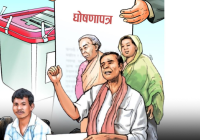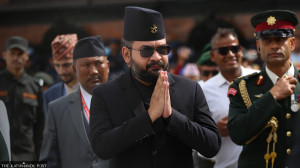Opinion
Where are we heading?
Formation of the federal states is essential to keep the constitution alive
Khagendra N. Sharma
Our political lords are engaged in a tug-of-war in which the rope itself is not secure enough to ensure a safe ground for the victorious. The ground is the so-called federal system and the rope is the new constitution. The constitution was forced to completion by determining the shape and size of the federal structure by a two-thirds majority in Parliament. The life of that Parliament is to end in less than two years, after which there can be no basis for the formation of next Parliament. Did the leaders ever care to know why? No. This senselessness is the cause of the recent political upheavals in the country.
Serious dialogue
The country is called a federal democratic republic as per the constitution, but it is incomplete with regard to the federal structure. The condition of completion laid down by the Constituent Assembly (CA) was the acceptance by Parliament of a certain shape and size of the coveted federal structure, for which no serious effort has even been initiated since last nine months. Who is responsible for the lapse? Yes, the government has been inviting the opposing Madhesi Morcha for dialogue, which the Morcha either rejected for not being sincere or it came out of the meeting midway placing new demands. The government kept its cool and put the blame on the Morcha. There was no serious attempt to sit for an exhaustive dialogue.
The Morcha has been dissatisfied with the constitution since the beginning, demanding not only some changes in the proposed federal structure but a re-write of the whole constitution. This stand of the Morcha was emboldened by India’s imposition of a prolonged undeclared embargo. Now the Morcha has changed its form of protest, but it is still far from satisfied. Even though the Morcha was not given a popular mandate to govern in the last election, it has raised a political voice which must not only be respected but also addressed. The best method of coming to a mutually satisfactory conclusion is a serious dialogue among the major stakeholders. But, where is the dialogue? Every party is blowing its own horn and nobody is responding. With the steady lapse of time, the eventual victim will be the constitution.
Looming disaster
The assumption on the eve of the constitution’s promulgation was that the coveted federal structure would be finalised within a reasonably short time and the basis for the election of next Parliament would be created so that at the termination of the tenure of present Parliament, a bi-cameral Parliament would herald the beginning of the republic. But without the federal units being formed, the constitution does not say how else Parliament and the executive government will be formed. Without the formation of the federal units, the present constitution will only be as important as the Interim Constitution or the 1991 Constitution—only of academic, historical value.
So to keep the constitution alive, the essential step is to revitalise the formation of the states. What is holding the formation of the states? It is the Morcha’s agitation, which has now been supported by some other ethnic groups. The only way out is to have a thorough dialogue. The federal structure has been debated for over a decade now. The two CAs have been elected and dismissed. But even now there is no solution in sight. Despite the promulgation of the federal constitution, the country remains a unitary state. The government should start the process of federalisation with the knowledge that it will be unconstitutional at the expiration of the tenure of present Parliament. The opposition, particularly the main opposition, should know that the road to forming an alternative constitutional government will also be closed by the same deadline. Are all political stakeholders looking to act in a stateless society? Then again, where is the initiative to keep the constitution alive to avert the impending political disaster?
The opposition
The only solution is to activate the proposed federal structure or an amended one if there is an agreement on a final form. Nepal has remained stagnant because its leaders are used to sitting or standing at the behest of the southern boss. But the boss has also shown its muscle by imposing a fatally injurious blockade. It is high time that the leaders compelled the actors on both sides of the fence to sit together, sort out the misunderstandings and find common ground. The Morcha’s best option is also to participate in the dialogue by shunning its senseless agitation, which has been going on for over nine months now. Finalise the federal structure; name the state capitals; appoint the governors; form interim coalition state cabinets; allocate required civil servants at the state level; provide security outfits; and make provisions for funding and essential services. That will prepare the foundation for holding state and central level elections. The government has announced its plan for conducting the required elections before the expiry of Parliament’s tenure, which is not possible without laying this foundation.
To conduct local level elections, some legal hurdles need to be overcome. This requires amendment to the laws or a new set of laws. If these small conditions are met, local elections can be conducted even at the present level of constitutional deadlock. But the local bodies do not form the federal structure; they existed in the unitary structure as well. If elected, the local bodies will provide a democratic semblance; however, conducting elections at the present constitutional shape does not ensure the foundation of a federal structure. It is good to get elected local bodies to replace the bureaucratic bodies that operate now. But staying there will not safeguard democracy. Forming states and conducting elections at the state and central levels as per the constitution will alone ensure a successful entry into the federal democratic structure.
The Nepali Congress leaders are senselessly impeding the parliamentary process in peripheral matters, wasting invaluable time. If they feel that they are responsible for the implementation of the constitution, they should shun the path of obstruction and help the government to implement the constitution and form a full-fledged federal Nepal.
Sharma is a political analyst. He can be reached at [email protected]




 7.12°C Kathmandu
7.12°C Kathmandu










